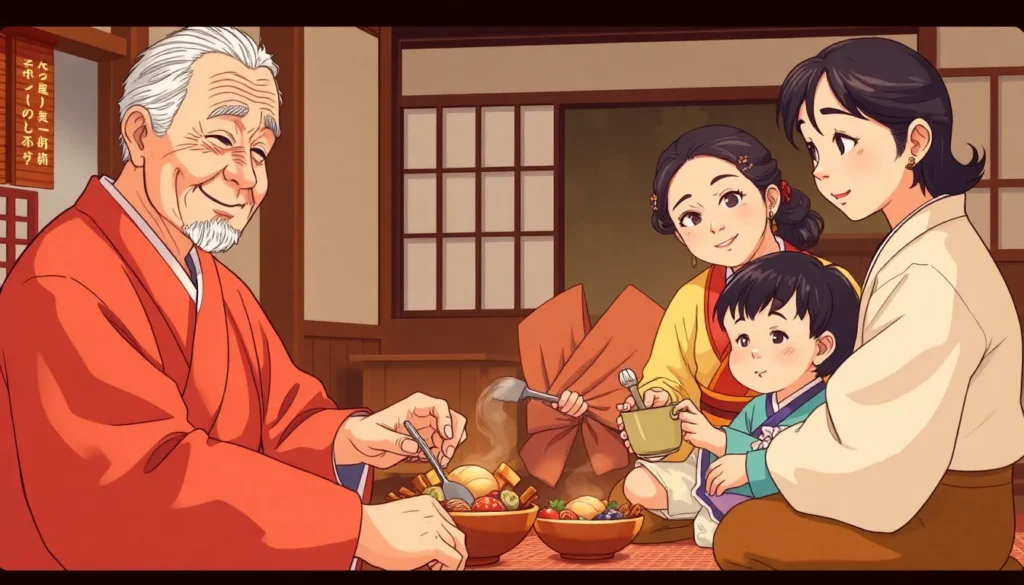Japanese family traditions are a delightful blend of history, culture, and a sprinkle of quirkiness that keeps families connected. From the art of tea ceremonies to the joyous chaos of New Year’s celebrations, these customs weave a rich tapestry that’s both heartwarming and intriguing. It’s like stepping into a living museum where every ritual tells a story, and every meal is a feast for the senses.
Table of Contents
ToggleOverview of Japanese Family Traditions
Japanese family traditions encompass a wide array of customs that reflect the nation’s rich cultural heritage. These traditions often revolve around communal activities, emphasizing harmony and mutual respect. Daily practices connect family members through shared meals, where they enjoy dishes like sushi and soba, highlighting meticulous preparation and presentation.
Holidays present another vital aspect of these traditions. New Year’s celebrations, or Oshogatsu, involve unique rituals such as the preparation of special foods like mochi and the performance of Shinto prayers. Engaging in these customs allows families to honor their ancestry while creating lasting memories.
Rituals like tea ceremonies also hold significant meaning. Participants experience an intricate process that promotes mindfulness and appreciation of aesthetics. These ceremonies, often conducted in serene settings, foster a sense of tranquility among family members and guests.
Birth and coming-of-age ceremonies further illustrate Japanese family values. Shichi-Go-San, a festival for children aged three, five, and seven, showcases the importance of celebrating milestones. Families dress children in traditional clothing, symbolizing pride and continuity of heritage.
In addition, memorial practices demonstrate reverence for ancestors. The Obon festival invites families to honor deceased relatives through offerings, prayers, and lantern ceremonies. Such acts strengthen the familial bond between generations.
Through these traditions, Japanese families cultivate a sense of identity and continuity. Each custom carries a story that unites individuals, emphasizing the importance of togetherness in daily life. Families transmit these traditions, ensuring cultural values persist across generations.
Importance of Family in Japanese Culture

Family holds a central position in Japanese culture, influencing social dynamics and personal identity. Strong familial ties foster connection and support within households.
Traditional Family Values
Traditional family values emphasize respect for elders and the importance of harmony. Honor and duty define relationships, guiding interactions among family members. Collectivism prevails over individualism, prioritizing the group’s welfare. Shared responsibilities encompass decision-making and child-rearing, reinforcing the bond among family members. Festivals and gatherings often act as platforms for nurturing these values, strengthening the family’s cultural foundation.
Roles within the Family Structure
Roles within the Japanese family structure reflect age and gender norms. Elders typically command respect and provide guidance, establishing a clear hierarchy. Fathers often assume the role of primary breadwinners, while mothers focus on nurturing and managing household affairs. Children carry the responsibility of honoring their parents through education and future success. Each member plays a distinct role, ensuring family cohesion and continuity, while also adapting to modern influences.
Celebrations and Rituals
Japanese family celebrations and rituals play a vital role in preserving cultural heritage. Families participate in various customs that strengthen ties and honor ancestry.
New Year Celebrations
Oshogatsu represents one of the most significant celebrations, marking the start of the New Year. Families prepare osechi ryori, a special assortment of colorful dishes, each symbolizing good fortune and health. Engaging in Shinto rituals, families visit shrines to pray for blessings. Additionally, children receive money in decorated envelopes called otoshidama, which fosters excitement and connection among generations. Traditional games and family gatherings further enrich these celebrations, reinforcing familial bonds.
Family Festivals and Gatherings
Japanese festivals, known as matsuri, often bring families together to celebrate regional traditions. Events like Tanabata and Obon signify the importance of family and ancestral respect. During Tanabata, families fulfill wishes by writing them on colorful strips of paper and hanging them on bamboo. In contrast, Obon honors deceased relatives with special dances and offerings, ensuring their memories endure. Food, music, and traditional dances enhance these gatherings, creating a lively atmosphere that deepens social connections. Each festival serves as a reminder of shared values and collective history, reinforcing the communal spirit integral to Japanese family life.
Daily Life and Parenting Practices
Daily life in Japanese families emphasizes strong communal ties and shared responsibilities. Parenting practices reflect a blend of traditional values and modern influences.
Child-Rearing Traditions
Child-rearing traditions in Japan promote respect, responsibility, and resilience. Parents encourage education, starting from an early age, with emphasis on discipline and hard work. Family members play a vital role; grandparents often assist in nurturing children and imparting wisdom. Celebrations like Shichi-Go-San mark significant milestones, allowing families to acknowledge growth and cultural heritage. During these ceremonies, children wear traditional attire, reinforcing their connection to ancestral customs. Overall, child-rearing practices focus on preparing children for success while valuing collective harmony.
Respect for Elders
Respect for elders forms a cornerstone of Japanese family dynamics. Children learn from a young age the importance of honoring their parents and grandparents. This value manifests in daily interactions, where polite language and gestures demonstrate deference. Family decisions often consider the opinions of seniors, showcasing their wisdom and experience. Elders serve not only as authority figures but also as cherished storytellers, preserving family history and traditions. Such respect promotes intergenerational bonds, ensuring the continuity of cultural values and practices vital to family unity.
Influence of Modernization on Traditions
Modernization has significantly affected Japanese family traditions. Changes in lifestyle and technology have led families to adopt new customs. Families now often prioritize convenience, leading to variations in traditional practices. For example, the preparation of osechi ryori during New Year’s has shifted, with many opting for ready-made meals instead of homemade dishes.
Urbanization plays a role in altering family dynamics. It introduces more demanding work schedules, which affect participation in traditional celebrations. Even daily routines, such as shared meals, face disruption as families balance busy lives with cultural practices. As a result, some families might find it challenging to maintain consistent observance of rituals like tea ceremonies or memorial services.
Technology also influences how families celebrate traditions. Digital platforms allow families to share experiences virtually, diminishing the need for physical gatherings. Online resources have introduced new ways to learn about customs, which might overshadow local practices. While technology fosters connection across distances, it can dilute the essence of physical presence during celebrations.
Cultural exchanges through travel and media have introduced new perspectives and ideas to Japanese families. This exposure enriches traditions but may lead to the blending of practices that change their original meanings. Younger generations, influenced by global culture, sometimes prioritize individualism, potentially straining traditional family values.
Despite these shifts, many families strive to preserve core traditions. They recognize the importance of cultural heritage and seek ways to adapt practices to fit modern life. Balancing the old with the new remains essential for maintaining cultural identity. Through conscious efforts, families can navigate modernization while honoring their roots, ensuring the continuation of cherished customs.
Japanese family traditions represent a rich tapestry of culture and history that continues to shape family dynamics today. These customs foster a deep sense of unity and respect among family members, bridging generations through shared experiences and values.
While modernization poses challenges to the preservation of these traditions, many families strive to adapt while keeping their cultural heritage alive. The balance between honoring the past and embracing the future is crucial for maintaining a strong family identity.
Ultimately, the essence of Japanese family traditions lies in their ability to connect individuals through meaningful rituals, ensuring that the spirit of togetherness remains vibrant in an ever-changing world.




